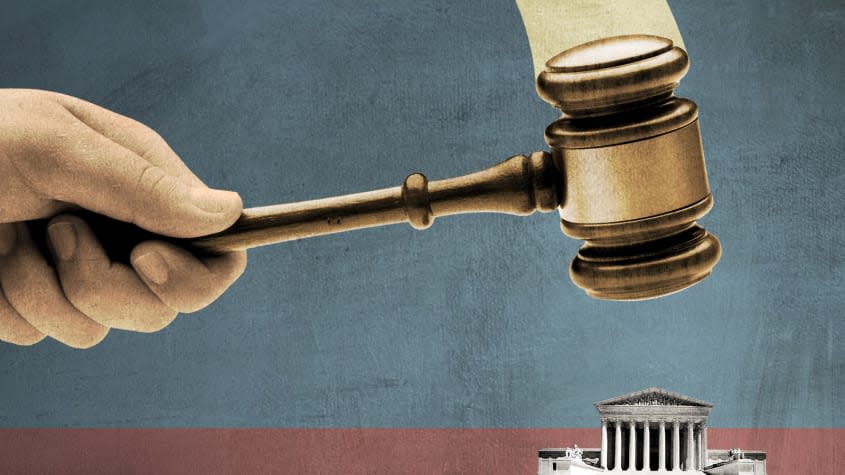What it means if Americans lose trust in the Supreme Court

- Oops!Something went wrong.Please try again later.
- Oops!Something went wrong.Please try again later.
- Oops!Something went wrong.Please try again later.
Confidence in the U.S. Supreme Court is at an all-time low — and a pair of landmark rulings handed down last week may or may not make matters worse. Will institutional legitimacy suffer now that gun rights have been expanded and Roe v. Wade overturned? Or, in correcting what the majority argued to be "egregiously wrong," did the court's nine justices simply reaffirm their role in the American experiment? Thought leaders wade into the debate:
Prepare for a new era, America
By ruling 6-3 to overturn federal abortion protections under Roe, the court's "heedless" majority has "done more to undermine the court's credibility than in any other action it has taken in modern times," argued The Washington Post Editorial Board. An aura of political independence and a steadfast commitment to "conscientiously interpreting the law, with regard to text, tradition, history, logic, judicial restraint and common practice" are crucial to the court's place in society. Now, for many, this illusion "will now be shattered."
Consequently, "[w]e are entering a new era of distrust and volatility in the legal system in a country that needs stability in its governmental institutions, rather than more venom and tumult," the board wrote. It is thus imperative that Americans realize "[t]hey must defend their rights, or they are liable to lose them."
'Claims of deceit' are harmful, too
In pushing back against Friday's abortion decision, some have argued that the conservative justices in the Dobbs v. Jackson Women's Health Organization majority lied to the Senate over whether they believed Roe v. Wade to be settled law. Sens. Susan Collins (R) of Maine and Joe Manchin (D) of West Virginia, for example, said they felt deceived on the matter, claiming Justices Brett Kavanaugh and Neil Gorsuch misled as to their respect for Roe prior to their individual confirmations. But, it seems unlikely that either justice made such a pledge, mused The Wall Street Journal Editorial Board.
For one thing, judges aren't meant to pre-judge a case, nor are they meant to suggest they carry any sort of bias, the board argued. Just because a prospective justice rightfully kept his or her cards close to their chest during their confirmation hearing, that does not mean they lied to the Senate on this or that matter. Such "claims of deceit," which suggest the court is "no different from the political branches," are also damaging to the court's credibility — and that spells trouble for both parties.
"The current majority won't last forever," the Journal continued, "perhaps not even many more years, and Democrats deriding the current court as political won't be pleased if Republicans make the same claim when their appointees are back in the majority."
Legitimacy is the court's only weapon — and it's gone
"All the Supreme Court really has to go on is the public's acceptance of its rulings as legitimate," The New York Times' Peter Coy opined on Monday. It does not have the power to enforce its decisions, and it works in obscurity, meaning public trust in "whatever is happening behind the curtain" is tantamount. But now, with these rulings, "the chaos begins," argued the Post's Dana Milbank. "The radicals have cast off any pretense of judicial restraint."
In both landmark decisions, the conservative majority's "selective application of history" reveals how "their reasoning is not legal but political, not principled but partisan," Milbank mused. And both, unfortunately, "foment maximum chaos and were delivered with flagrant disregard for the instability and disorder they will cause."
Further, "Justices are not kings," Dahlia Lithwick added in Slate, meaning though they can "demand silent reverence," it is simply not guaranteed. Friday's Dobbs decision "confirms that, if and when the public is finally ready to give up on the court, there will be nobody to blame but the six justices who gave them nothing to believe in."
The backlash to the decision reaffirms the court's legitimacy
Actually, the original Roe v. Wade decision was where the courts went political, attorneys Daivd Rivkin and Jennifer Mascott recently wrote for the Journal. But Dobbs "belatedly corrects that error by recognizing that the federal judiciary's constitutional role is merely to decide cases and controversies … ."
To that end, the pair continued, the court "does its most important work when it renders decisions that are unpopular but legally correct." The Dobbs decision therefore "suggests a majority committed to the court's proper role, which is to decide cases independent of political and popular winds."
You may also like
Why isn't Lightyear taking off at the box office?
Former Trump aides vouch for credibility of bombshell Jan. 6 witness: 'I don't think she's lying'

